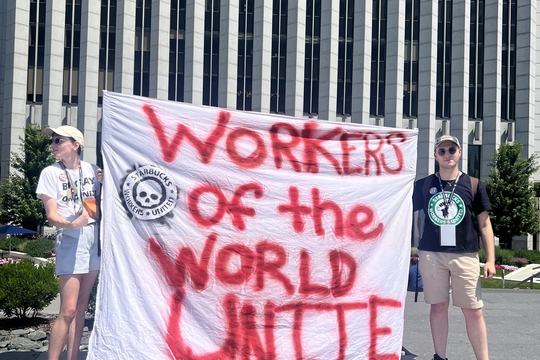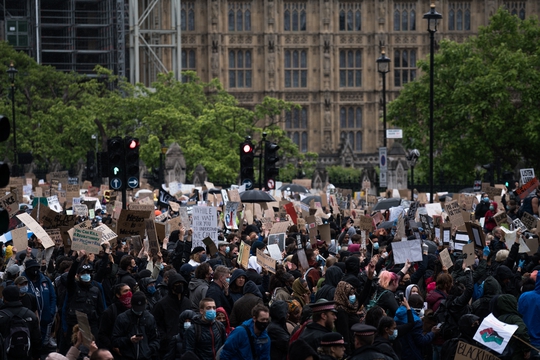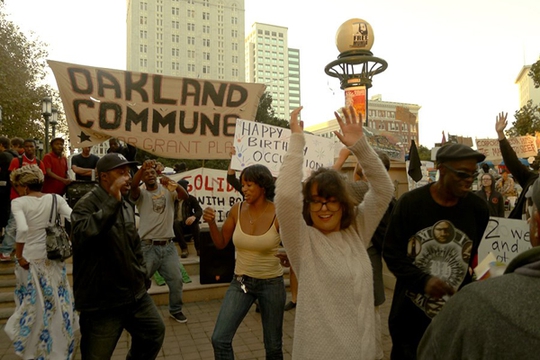Get a Job and Organise It
by
Anonymous Starbucks Worker
December 28, 2023
Featured in The Political Leap: Communist Strategy Today (#19)
An anonymous Starbucks worker recounts the early days of the Workers United campaign in Buffalo, New York, and the role “inside-organisers” or workplace salts played in getting it moving. They discuss how a strategy of rank-and-file shop floor organising and the legal might of a major union combined to take on a giant corporation.

inquiry
Get a Job and Organise It
by
Anonymous Starbucks Worker
/
Dec. 28, 2023
in
The Political Leap: Communist Strategy Today
(#19)
An anonymous Starbucks worker recounts the early days of the Workers United campaign in Buffalo, New York, and the role “inside-organisers” or workplace salts played in getting it moving. They discuss how a strategy of rank-and-file shop floor organising and the legal might of a major union combined to take on a giant corporation.
This article is dedicated to the tenacious and brave baristas in Buffalo, NY and around the United States organising Starbucks Workers United. They have put their livelihoods on the line and gone through hell to fight for the simple and righteous idea that the workplace should not be a dictatorship.
In early 2021, I found myself scrolling job postings for union staff organisers. Having no real experience organising outside of electoral politics, one cryptic posting seemed a perfect fit - “Project Germinal,” described as an organising internship. What I thought was a simple union training program turned into something far more inspiring. A zoom call with the advert’s poster, Jaz Brisack1, Organising Director for Workers United Upstate, revealed what we’d be up to: getting jobs at Starbucks, finding pro-union workers and leaders, and moving them to action. The next thing I knew, I was living in Buffalo, New York, along with 10 or so other “inside organisers” (our preferred term for salts) spending 30 to 40 hour weeks making lattes and frappuccinos, shaken iced beverages, and cooking frozen breakfast sandwiches.
Inside organisers in Buffalo ended up receiving far more than a simple union how-to. We stood side-by-side and learnt from the inspiring and courageous leaders of the Starbucks workers movement, as they beat back the most vicious union-busting campaign of our generation. They won union recognition by election or bargaining order at half of the nearly 20 stores in the area, and inspired the re-ignition of grassroots unionism across the country.
As Jaz often repeated during our campaign, “there is no unorganisable workplace, only workplaces that haven’t been organised”. I want to offer some perspectives on a workplace organising strategy that will hopefully be informative, and show that inside organising is something anyone can do. The first is about union bureaucracy in the US. By gaining the financial backing of an international union, Starbucks workers were able to effectively leverage a pro-union turn in labour law. The second is on the efficacy of salting. The larger the corporation, the deeper and more long term the preparation for the organising campaign needs to be. Lastly, I offer a brief reflection on organising in the service industry. Needless to say, work sucks and organising is hard. But by leaning into love and solidarity with your co-workers, a better world is possible.
On Bureaucracy, Biden, and Big Labour
Almost any group of workers in the US can gain union recognition through a process overseen by the National Labor Relations Board (NLRB). If eligible workers in an “appropriate bargaining unit” can demonstrate sufficient interest in forming a union - typically by having at least 30% of the workers sign union authorisation cards - the NLRB will conduct a union recognition election. An employer can, also, voluntarily recognise workers who have organised, but such cases in the US are few and far between. However, some of this is changing in surprisingly pro-worker ways, as described under new rules laid out in the NLRB’s August 2023 Cemex ruling.2
At a company like Starbucks, what is an “appropriate bargaining unit”? The legal definition is rather underdetermined (“a group of two or more employees who share a community of interest and may reasonably be grouped together for purposes of collective bargaining”), but it is mostly based on past precedents and present litigation. In the early 2000s, a group of Starbucks workers in Manhattan suggested single-store bargaining units, but their organising effort was effectively thwarted.The company litigated to expand the bargaining unit from one store to three dozen stores, and the workers were unable to engage in a financially burdensome legal battle. However, decisions about interpreting labour law ultimately fall on federal agents at the NLRB who are appointed by the executive branch of the federal government. In the early 2000s, a Bush presidency meant unfavourable decisions for workers at the labour board. The election of Joe Biden in 2020, despite his limited progressivism, presented hope for a more favourable turn, and therefore the potential to overcome these past precedents.
One of the Starbucks campaign’s organising mentors, Richard Bensinger, would often share the belief that workers in Buffalo would only need to win at one store. With a victory at just one store, we’d shift the paradigm - from the absolute limit of nothing to the infinite possibility of something. Realising that we had significant initial pro-union majorities at a handful of stores, we proposed a strategy of single-store bargaining units that we knew would be high-probability wins. Within two weeks of our organising committee going public, we had filed petitions with the NLRB to hold union recognition elections at six different Buffalo area stores. To our amazement, NLRB agents upheld the Buffalo workers’ single-store proposition.
These pro-worker NLRB decisions were not a given. To take advantage of this pro-worker bureaucracy, you still have to engage in a deeply burdensome process that takes a lot of money to pay lawyers, and a lot of time to wait out during the litigation. Starbucks baristas’ collaboration with Workers United, a well-funded international union, has been crucial throughout this process. There are plenty of valid criticisms of North America’s biggest unions and their corporate collaborationism across the last century. But if you want to beat a big corporation, you’re likely to need the NLRB, and for that you’re likely to need the kind of financial resources that grassroots unionism struggles to assemble. Even still, Workers United dues revenue is not capable of organising 400,000 Starbucks workers. New mass worker organising is incredibly expensive, which is the primary reason that the biggest unions have failed to make it a priority.
At Starbucks, things played out a bit differently from the typical union campaign. After the first union recognition election wins at the Elmwood and Genesee Street stores in December 2021, baristas from around the country began reaching out to us in Buffalo in numbers that could not have been predicted.
These election wins inspired a paradigm shift in what was possible. Having been through a hellish union busting campaign, baristas in Buffalo were then able to coach other baristas around the country through the process of organising their own stores. And in the first half of 2022, worker leaders from Buffalo were spending 10 to 20 hours a week on zoom calls with other Starbucks workers across the country, coaching them how to effectively beat the company’s union-busting tactics and win the union recognition process. Rather than running an organising campaign dependent on well-paid union staff organisers - with average salaries upwards of $70,000 a year - the Buffalo baristas themselves became their own organising staff of sorts, at practically no cost to the union.
What’s the takeaway here for other committed organisers? Perhaps the more radical wing of trade unionists ought not to fully abandon the bureaucracies of the union or the nation-state - though, of course, the legal terrain differs from state to state. What does not differ, however, is that workers know their workplace best, and those who succeed in winning union recognition will best understand how to coach others through the particular organising tasks at hand.
On Salting
So, why Buffalo? Beating a massive corporation like Starbucks can’t happen on a whim. It takes some concerted planning that starts with manageable and winable goals. In 2019, baristas at the Buffalo coffee chain, SPoT Coffee launched a successful organising campaign with the support of both Jaz and Workers United. But If you want your union to have power, you can’t just stop with organising a single company—you have to organise the entire industry.
In the service industry, the commodity of service is about the worker handing a product directly to the consumer, rather than being delivered through a multi-national logistics network (even if this might be how the product arrives in the store). The service industry allows for power to be built within a localised region, as opposed to across the entire geography that a company operates. If you wanted to take Buffalo cafe organising seriously you were always going to have to organise SPoT Coffee’s biggest competitor in Buffalo - Starbucks.
To organise Starbucks in Buffalo, baristas formed an organising committee of workers strong enough and large enough to organise the roughly 500 baristas across twenty cafes. To do this, an unconventional approach was proposed: deep-rooted organising on the inside - long-term salting. Historically, most salting has been no more than a one or two month commitment: get in, find a list of workers, sus-out whether the shop is hot or not, and then leave. But organising a strong, rank-and-file powered union is ultimately about building relationships. The fight against the boss is less about having the money to sustain it than it is about having a mass of organised workers committed to it.
Building the kind of organising committee that could fight the long fight against Starbucks required building an organisation with far deeper relationships than that of a servicing-model union. Beating Starbucks would need a robust barista community of care, rooted in solidarity, mutual aid, and serious consciousness raising. As a result, rather than enlisting a few people to do the peripheral work of list building, a handful of inside organisers were recruited who were willing to commit 6 months to a year on a project of deep relationship building, helping Starbucks workers establish the vital support systems that would launch their campaign.
In Buffalo, salts were evenly distributed across twenty stores. We were each placed at a home store, whilst also picking up shifts at other stores whenever we could. Through months of deep relationship building, we were able to effectively seed and grow an organising committee. This was done through systematic workplace mapping that led to hours of quiet organising meetings with the most agitated and well-respected Starbucks workers. We coached our Starbucks co-workers on the variety of anti-union tactics that the company would inevitably employ and stood with and supported those workers to lead the movement as a whole.
What propelled us and allowed this campaign to be successful was a vision hyper focused on the local, not the local union, but the local geography. We were firmly committed to organising Buffalo and making it work. It was only after the campaign got going that workers from around the country started reaching out to us, and we really didn’t do much work to reach out. They started reaching out to us because the example had been set. It just took off like wildfire at that point.
As the campaign really got going we had tons of organisers and we knew workers were talking. The aggressive union busting tactics of the company were starting to scare people. It was then we started to do more direct outreach, walking into stores in a city and trying to have conversations with baristas. The Starbucks campaign was so well advertised that if people in a Starbucks shop wanted to organise, they knew where to go. The social media outreach was tremendous. Twitter, Instagram and tiktok were just massive, and the Starbucks staff, for the most part, is very online.
On the organisability of the service industry.
Everybody has to work, and there’s no holy or sacred reason for it. At a place like Starbucks, there is a brutal churn that grinds on workers, which can mute an organising mindset. I was often thinking: “I’ve got to get this task done, because my coworkers rely on me getting this task done, so just let me do this task”. While I took the job at Starbucks to try and help organise workers, the number of days where I would go into work at my cafe and completely forget why I was there were countless. I was just in the cafe, doing the job, just another suffering proletarian neoliberal subject.
I think this is about alienation from production, from the commodity that we were producing. At the end of the day, I don’t think that there’s anything particularly joyful or good about Starbucks as an institution and the kind of culture it creates. It doesn’t truly build any kind of robust community space that a cafe location could. When you’re forced to get 40 seconds out-the-window drive-through times, you don’t have time to give a shit about community.
But then, of course, an organising mindset did come pretty naturally to the organic leaders at Starbucks, especially many who’ve been with the company for several years. It’s what makes them leaders to begin with, and it’s why the Starbucks workers movement has been incredibly strong. Starbucks proved a perfect storm for organising in some key ways: a global pandemic that turned service industry jobs into death factories; a centralised corporate ownership structure with a comically prideful figurehead; a contradictory business ethic built on sit-down café culture that instead prioritises robotic drive-thru speed; and, perhaps most critically, a company with a progressive image that has historically attracted a progressive and queer or pro-queer workforce.
Organising work is ultimately care work, something that the queer community has foregrounded in its own organising for decades. It should be no surprise then that the leaders of the Starbucks workers’ movement are largely queer themselves. These worker leaders are practising an ethic of radical care that reanimates the company’s faux-progressivism and subverts the disorganising power of capital.
That’s exactly what’s necessary to beat it. Care. It’s why I wanted to organise, and it’s why Starbucks baristas continue to organise. That’s what a rank-and-file powered union is: a mass of workers committed to unabashedly practising an ethic of care, both inside and outside the shop. Starbucks workers are winning back their workplace with that care.
If you want to organise workers, the best way to do it is to be a rank and file worker yourself. So take a job and make your vocation organising instead. Particularly if you’ve got a safety net, why not? Grab a few of your friends, and go and pick a workplace to organise! What are you waiting for? Get on the job and organise!
author
Anonymous Starbucks Worker
Subscribe to Notes from Below
Subscribe now to Notes from Below, and get our print issues sent to your front door three times a year. For every subscriber, we’re also able to print a load of free copies to hand out in workplaces, neighbourhoods, prisons and picket lines. Can you subscribe now and support us in spreading Marxist ideas in the workplace?
Read next

Anti-Racism from Below: An interview with Joshua Virasami
by
Joshua Virasami
/
Dec. 28, 2023

